 “The war in Ukraine will come to an end; democracy will be strengthened”
“The war in Ukraine will come to an end; democracy will be strengthened”
(P. Bystrova, the 2017 participant of the European Forum Alpbach)
Modern Ukraine is surreally divided. In Kyiv or Odesa, rather well off young professionals plan visa-free trips to Italy or Malta and buy fireworks to celebrate the New Year. They know that the war in Donbass is ongoing, the ‘reintegration’ of the occupied territories remains a distant prospect, and children in Donetsk are afraid of fireworks due to artillery shells and enemy fire. The EU threatens to suspend the visa-free regime if President Poroshenko fails to establish the specialized Anti-Corruption Court. The hottest topic of 2018 so far is Poroshenko’s ‘mysterious’ and strikingly expensive Maldives vacation. The hryvnia shoots beyond UAH 28 per U.S. dollar. Opponents of Euromaidan promote nostalgia about the Yanukovych regime, when the dollar bought 8 UAH. Its proponents, once again, ‘advertise’ the Association Agreement and the visa-free regime with the European Union. The EU itself experiences division and turmoil. The 2018 presidential elections in Russia will carry no surprises.
Ukraine’s multi-front fight against the war in the east and for Western democracy prominently features in the present contributions of the student participants of the panel “War and Democracy in Ukraine”, which took place at the European Forum Alpbach in August 2017 with the generous support of the National Endowment for Democracy. Praskovya Bystrova and Ganna Dudinskaya speak about the future of the ongoing armed conflict in Donbas. Anton Kolvakh unpacks the problem of dysfunctional democracy in Ukraine. Liliia Malyarchuk calls for Ukraine to become “a modern and effective country”, not for the benefits of EU membership, but instead “for its own sake”. Based on the concept of “phantom democracies” by the renowned Australian political scientist John Keane, Maryna Rabinovych discusses the despotism-based regimes in Eurasia as a challenge for values-oriented liberal regimes. Finally, Iryna Kupchynska suggests that Ukraine’s place in Europe should involve “flexible integration along functional lines”, utilizing communication as a crucial tool to bring Ukraine closer to the European Union. Thus, the contributions reflect the present debate on war and democracy in Ukraine, featuring the major topics relating to Ukraine’s internal and external policies.
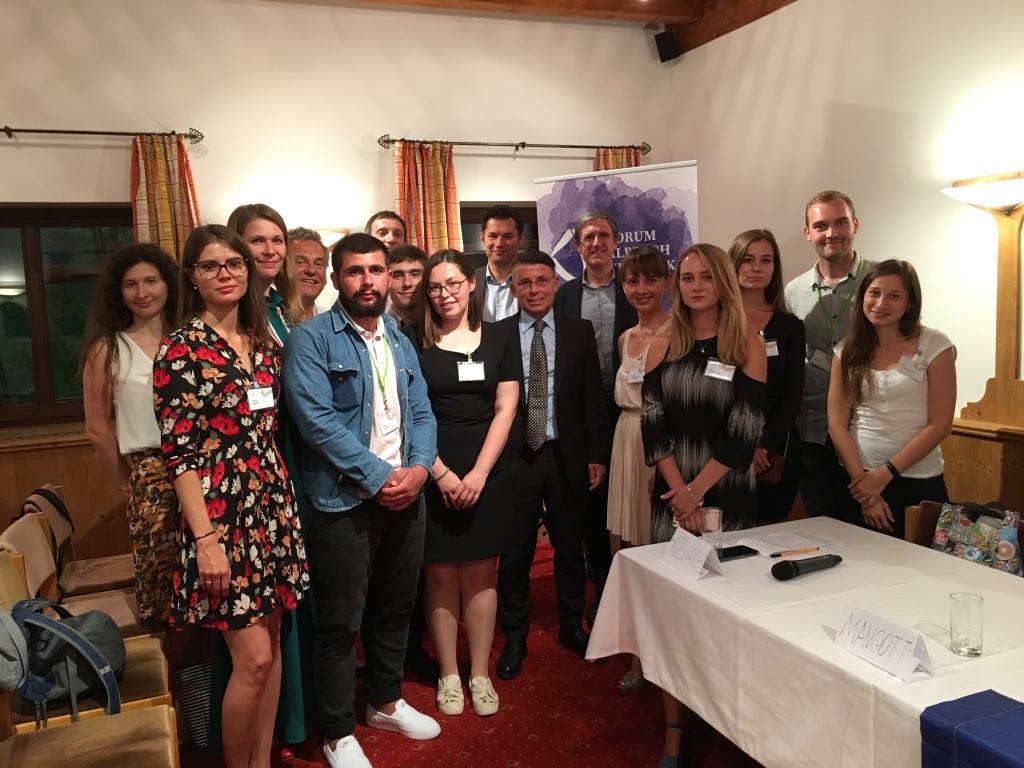 Praskovya Bystrova
Praskovya Bystrova
War and Democracy in Ukraine
The war in Ukraine will come to an end; democracy will be strengthened.
Although the war began with events allegedly based on democracy’s best manifestations–protest, elections, etc.–this is our only hope and the only scenario that seems possible. In our case, these were just well-planned acts of manipulating the Ukrainian people and the international arena. Simultaneously, international law collapsed and a strong civil society appeared in Ukraine. This was not the result of one after another. Instead, it was born from a coincidence of circumstances, which in turn became Ukraine’s only real chance to resist a frightening foreign aggressor.
While it may sound unpalatable, the conflict in Ukraine–of ideas, beliefs, religions, and weapons, as well as of finances and ambition s–presents a real chance for Ukraine to revive, regain, and rebuild its democracy, freedom, and prosperity. A secure and prosperous Ukraine is a chance for Europe to defend and preserve its democratic foundations, which are largely under threat and questioned these days.
Ukraine surprised not only the whole world, but also itself. We suddenly felt fearless and powerful; no one will agree to easily let this feeling go. Ukraine has the only one possible path: democracy, where the majority respects the minority, instead forcing the minority to adapt to the majority. In Ukraine, there will be no war in the future; there are decades of peacemaking dialogues, reconciliation, and punishment of violators without exception. An approach based on human rights will help to restore this balance.
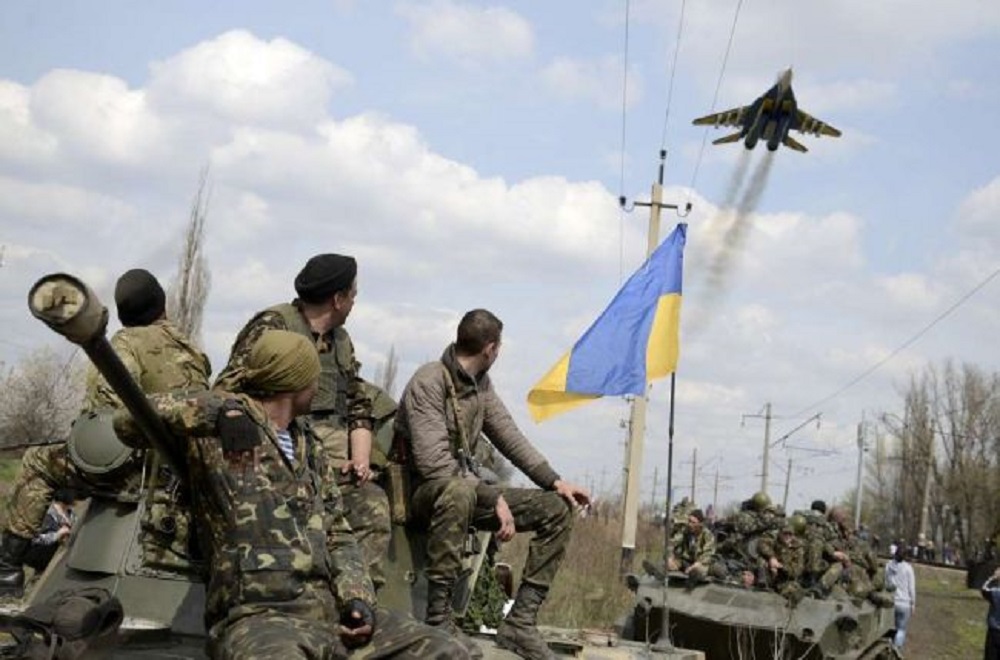 Ganna Dudinskaya,
Ganna Dudinskaya,
LL.M student at Central European University
The future of Donbass: three most likely scenarios
On April 14, 2014, after armed takeovers of city administrations in the eastern Ukraine, the government officially declared the start of the antiterrorist operation in the Donbass region. On May 26, 2014, the first battle at the Donetsk International Prokofiev Airport began. A war followed, which, although widely expected to quickly end, continues to this day. The war has become a challenge for the international community, Ukraine, and for every Ukrainian. At the same time, the war in Donbass has become the subject of numerous discussions regarding its resolution. As an internally displaced person (IDP) from Donbass myself, I have lived and breathed this war, and I hereby present the three main scenarios which, in my opinion, are the most likely to happen.
- A frozen conflict: the active armed conflict will stop; however, there will be no peace treaty or other political framework for its resolution. Examples of frozen conflicts in the former Soviet Union and abroad include in the disputed territories of Abkhazia and South Ossetia in Georgia, the conflict over Nagorno-Karabakh between Armenia and Azerbaijan, the decades-long tensions between India and Pakistan, and the unresolved status of Northern Cyprus.
- Ukraine returns the territories.
2.1. Croatian scenario: a military storm operation aiming to regain the occupied territories and rebuild the economy and infrastructure of the region. This scenario would lead to huge destruction and human losses, both civilian and military.
2.2. German scenario: a peaceful agreement between the governments of Ukraine and the so-called Donetsk and Luhansk People’s Republics. As a result, with the support of the international community, Ukraine will retake the territories by using soft power and diplomacy. This scenario will be difficult to realize, due to the Russian Federation’s influence.
- The Russian Federation officially recognizes the so-called Donetsk and Luhansk People’s Republics and then includes them to the federation: of all three scenarios, this is the most unlikely one, since it will not be economically profitable for the Russian Federation because of international sanctions and the subsidized status of Donbass.
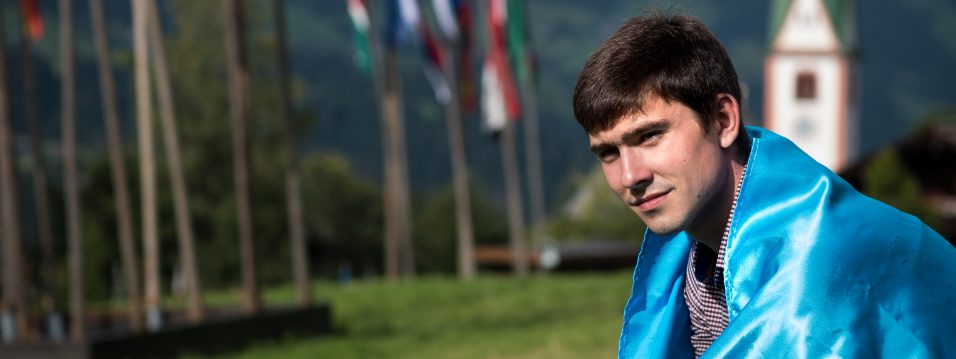 Anton Kolvakh,
Anton Kolvakh,
PR Manager at the Coordination Center of Displaced Universities
“Democratic” vs. “oligarchic” Ukraine: what are the key barriers to democratization in the conditions of war? What is the future of Ukraine?
The concept of democracy and democratization is very extensive, and many people and political scientists understand it in different ways. However, this essay will approach the concept as the possibility of ordinary Ukrainians participating in democratic processes and exercising real influence on the adoption of key political decisions.
To solve this issue, it is necessary to unpack and analyze the main elements of the problem. This approach will help us understand and objectively evaluate the essence of the problem, and will provide an opportunity to propose a scenario for democratization in Ukraine.
Democracy
Democracy is not the same process for every society. Theoreticians of democratic transitions have already demonstrated, by examining the first stage of democratization in the countries of the third world, that simply copying of the democratization of developed Western countries does not result in a successful democratic transition. Rather, local culture and context play a significant role in the process of democratization. Hence, the Orange Revolution of 2004 did not succeed as predicted due to the special “political context” of Ukraine. In this regard, democracy in Ukraine is possible, but only considering our traditions, culture, and actual context. Thus, there is a specific Ukrainian democracy.
Conditions of war
The war is a key factor in the complication of democratization of Ukraine, which is expressed primarily in the fact that most of the resources and forces are directed to finding a resolution to the war. The lack of economic support for the development of the main democratic institutions–including electoral process (the participation of citizens in elections) and civil society–hampers the process of democratization. Thus, according to numerous studies, in Ukraine there are formally democratic institutions, but of the realization of a political culture and a democratic outlook are still in a state of infancy. The process of democratization is proceeding through increasing popular involvement through active participation both in the reform of the state and in the volunteer movement. However, there are insufficient resources, especially economic ones, to speed up this process, as such resources are geared towards solving the problem of war in Donbass. Thus, in this case, we see the logic of priorities–it is necessary to solve a problem of higher order, and then move on to issues that are not very critical.
Oligarchy
“Oligarchic democracy” is exactly the type of democracy that presently exists in Ukraine. Initially financial and industrial groups “ruled the ball” in Ukraine, an act now fulfilled by individual oligarchs as monopolists on the adoption of key administrative and political decisions due to their possession of the main financial and media resources.
Naturally, in Ukraine there is a democratic political regime with basic democratic institutions. With the Revolution of Dignity, the political culture of society has shifted to a new level–towards activists.
However, even with society’s strong desire to influence the adoption of key decisions, they will meet with certain procedural barriers if they do not meet the interests of the “monopolists of political power” in Ukraine.
Naturally, there is not one, but several, such monopolists in Ukraine. However, in this essay, we are talking about democracy at the level of society–the state from the perspective of the ordinary citizen.
Thus, we have key barriers to the development of democracy in Ukraine:
- Control of the adoption of key political decisions by individual “monopolists”;
- The conflict in the Donbass, which consumes a considerable amount of resources, in turn leading to a reduction of resources available to finance democratic reforms;
- The still insufficient level of activist political culture.
In this regard, Ukraine is dependent on these factors and their solution will contribute to the development of democratization.
If these factors deteriorate, the following scenarios may eventuate:
- A large escalation of the conflict in Donbass, which might see active military actions and the transition of Ukraine to a state of martial law. There is no question of any democratic processes under this scenario; wartime laws will come into force;
- “Monopolists” will still control the adoption of key decisions by themselves. Popular initiatives will be suppressed, which will lead to a recreation of the mass social protests of 2013. Another possible outcome would see monopolists “play” in democracy, responding to people’s requests, but, all the same, retaining control over the adoption of key decisions and creating a model fictitious democracy;
- Ukraine’s political culture will not turn become activist-orientated, which will lead to the same problem–form without content, the existence of formally democratic institutions absent of truly democratic practices and traditions.
These scenarios are hyperbolized; they are hypothetical but, under certain conditions, quite possible.
Their development is unlikely if the events of the Revolution of Dignity have become a point of bifurcation in the development of an activist political culture for Ukraine. This process has already begun, and it will continue. The question is only how quickly will it take place? This depends on two previously mentioned factors–the war in the Donbass, and oligarch’s monopoly on decision-making. The war is a priority issue that goes beyond the domestic policy of Ukraine and will not be resolved without international support. However, Ukraine’s public sector is strengthening and will sooner or later give the oligarchs a choice: accept the rules of the game of democracy, or lose it.
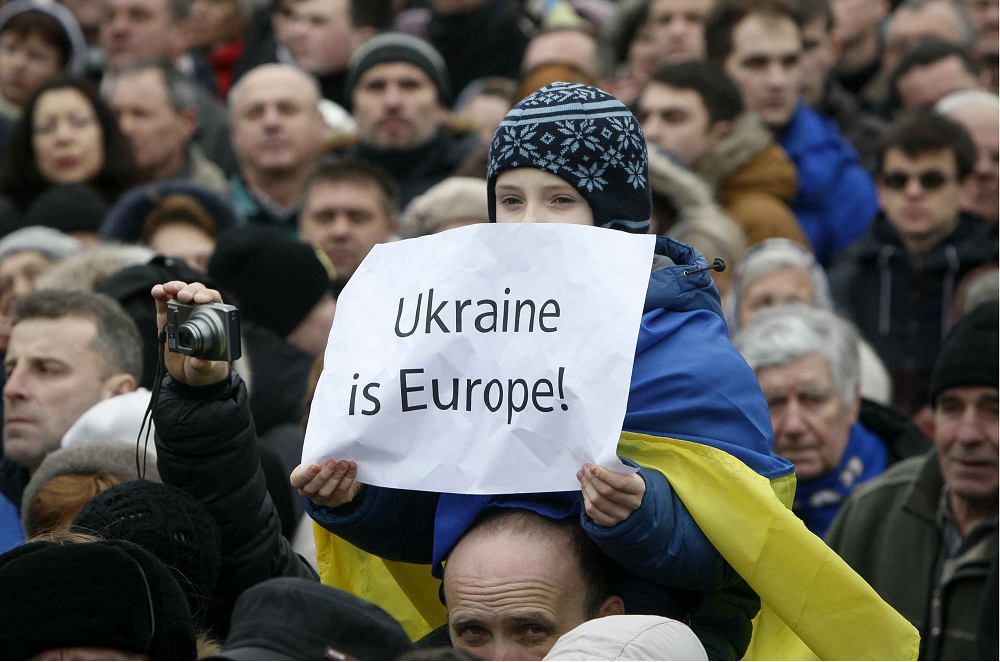 Liliia Malyarchuk,
Liliia Malyarchuk,
PhD Candidate in Law at the Jagiellonian University
What is the future of the EU? Is there a place for Ukraine?
The last decade has been quite troublesome for the European Union. It faced several internal and external crises from the 2008 financial crisis and Greece’s financial problems to Brexit and its complications. Each new crisis added more problems and tensions for member states. Financial crises worsened the economic situation, which in turn gave nationalist and Euro-skeptic rhetoric more appeal. The refugee crisis only escalated tensions among EU members and strengthened the authoritarian tendencies of the regimes in Hungary and Poland. The UK’s decision to leave the EU created a new set of problems with the rest of the Union, and may revive disputes with Spain over Gibraltar, with Ireland over Northern Ireland, and with Scotland over its independence. In such a situation, it is difficult to predict the future of the EU. Clearly, the EU itself needs to change, to become less bureaucratic and more flexible. It needs to react to new challenges, which will only continue to rise, more swiftly and decisively.
In such a situation, Ukraine’s membership prospects look unlikely–at least in the short term. The EU fears that Ukrainian membership will only bring more problems and instability, that acceptance of new members will make the decision-making process even more complicated, and that Ukraine’s membership in the EU might further entail escalating tensions with Russia. The EU already has member countries that are in a state of frozen conflict (e.g., Cyprus), or were at war with its neighbor in the recent past (e.g., Croatia). Understandably, the EU is, and will continue to be, reluctant to accept new ‘conflict’ or ‘post-conflict’ members when it can avoid doing so. This is especially so when we consider the example of Bosnia and Herzegovina, which itself continues to handle the legacy of its recent past, is currently a primary candidate for accession.
Despite that, Ukraine has a lot of potential, and one day may become a successful and prosperous member of the EU. However, two sets of problems need to be resolved for this goal to be achieved. First and foremost, Ukraine itself should change. It should develop its economy, reform its state governance, and tackle corruption; in other words, it must become a modern and effective country–not for the EU or the benefits of membership, but instead for its own sake. Such changes will ultimately benefit Ukraine and its citizens. Once this goal is achieved, discussions and debate over Ukraine’s EU membership––or participation as future members of the European Economic Area and Free Trade Association, like Norway and Switzerland–will follow.
One must keep in mind that EU membership, on its own merits, should not be Ukraine’s goal. All the reforms and development are necessary and should be implemented not for eventual accession to the EU, but instead to build a successful democratic Ukraine that will be a desirable place of living regardless of EU membership. As a society, we need these changes and reforms for ourselves not for the European Commission in Brussels. European anxieties over Ukrainian membership to the Union will disappear when they will see the changes Ukraine will undergo.
The second set of problems relates to the ongoing conflict with Russia. Clearly, Russia has been unwilling to accept Ukraine as an independent country and will try to prevent our EU and NATO membership aspirations. The key to resolving this issue is the strength of our economy and the resilience of our institutions. The stronger Ukraine becomes, the harder it will be for Russia to impose its agenda. Therefore, by resolving the first set of problems, by reforming and developing the economy, building a democratic and rule-of-law based system of government, we will create the opportunity to resolve the Russian question. To do so, we will need the international community, especially from the EU, to provide significant support–however, Ukraine should continue to display its desire to change.
It is worth mentioning that Ukraine has already done a lot, many reforms have been implemented and many are in preparation. This process may be not as fast as we would like it to be, but it would be unfair to avoid mentioning the huge work that has been done already. The decentralization reform, procurement system, police and judicial reform, and the modernization of Ukrainian army, to name but a few. We should recognize that reform is a long and costly process, and, what is even more impressive, all this have been done during the ongoing conflict in eastern Ukraine.
European fears of Ukraine are of a double nature. The first fear is the fear of Ukraine itself. Some EU members are afraid that Ukraine is not yet ready for EU membership and that Ukraine’s accession to the EU will impose a substantial economic burden. They also fear that Ukraine may bring political instability, which, in turn, will only further complicate the already complex decision-making process of the EU’s official organs.
Secondly, the EU fears the reaction of Russia, which has long perceived Ukraine as a part of its sphere of influence. Such fears clearly are merited, but if the EU wants to present itself as a union based on democratic and rights-respecting values, it will have to take that risk eventually. Ukrainian-Russian relations passed the point of no return during the annexation of Crimea. After the annexation and subsequent war in Donbass, it would be not only cynical, but also unwise, for the EU to allow Russia to behave in such a way. It may encourage other authoritarian states (Russia included) to perform the same type of politics which will undermine the existing system of international peace and security.
To conclude, the answer to the question whether there is a place for Ukraine in the EU depends largely on our efforts as a state and our effectiveness in implementing reforms and developing the economy. The outcome of the Ukrainian-Russian conflict in Crimea and eastern Ukraine, in my view, depends on these reforms as well. The stronger Ukraine becomes, the more opportunities there will be to join the EU and successfully end the war.
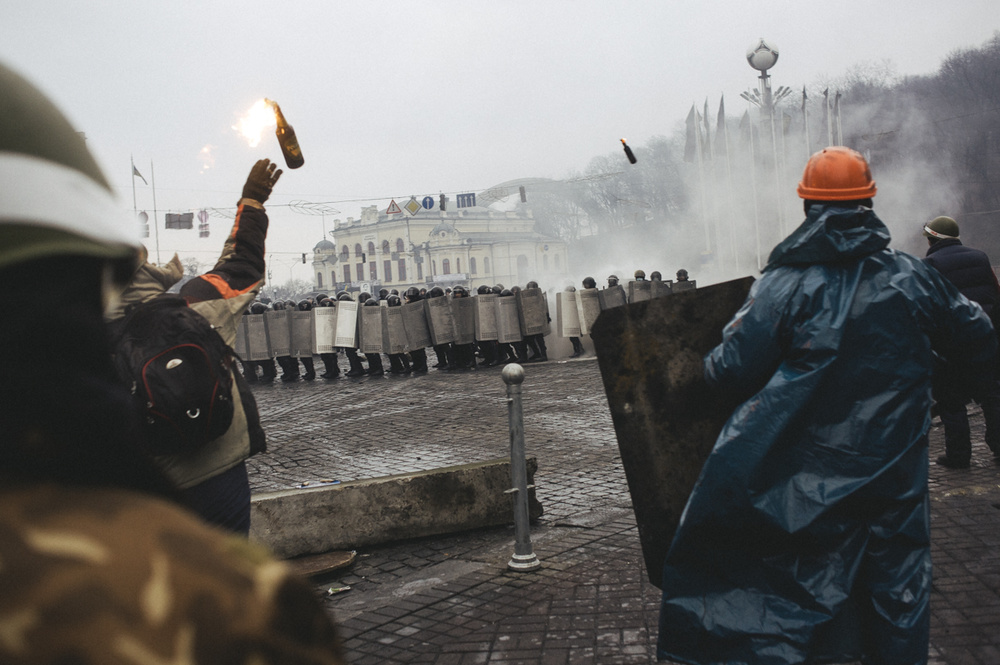 Maryna Rabinovych,
Maryna Rabinovych,
PhD Candidate at the Odesa National University, Global Community Manager at the Ukraine Democracy Initiative
The new despotism of the 21st century: the end of democracy. Why violence is dangerous for democracy?
The modern era has witnessed a tremendous diversity of political regimes–as well as of the forms of inter-state conflict and cooperation–which often makes it hard to apply traditional political science and international relations concepts. What impresses me about Professor John Keane’s approach is his ability to conceptualize new regimes and forms of cooperation through insightful analysis, linking various points on the map–from Moscow to Shanghai, Vietnam to Dubai, and Belarus to Turkey. Foremost, I would agree with Prof. Keane that a new geopolitical centre is currently emerging in Eurasia. This thesis can be substantiated by the emergence and development of new integration structures, such as the Shanghai Cooperation Organization, BRICS, and the Eurasian Union.
As for the West, this rising geopolitical centre presents a challenge to preserving its power in the international arena and determining the mode of cooperation with emerging powers and respective integration structures. However, the situation is aggravated by the fact that many regimes in wider Eurasia represent ‘phantom democracies’, addressed by Keane as despotism-based regimes. I would argue that such regimes possess three features that make them especially dangerous for the West, particularly in their proponency of democratic values. First, regimes such as Russia, China, and the Gulf States cannot be explicitly referred to as authoritarian given their high flexibility, adaptability to changes, and developed learning capacities, which leads to their persistence. Second, while the EU is busy with developing new strategies to counter populism, ‘phantom democracies’ exemplify its victory, founded on strong middle classes and a desire for comfort and indulgence. Finally, it would be wrong to argue that these regimes are explicitly violent: their violence is often hidden or manifested in hybrid forms while tolerated by comfort-seeking citizens.
Subsequently, new Eurasian regimes are durable, shifty, flexible, yet appealing. By cooperating for the sake of further economic gains, they represent an explicit challenge for liberal democracies and their efforts to promote peace, democracy, human rights, and the rule of law beyond their borders.
Iryna Kupchynska,
Project Coordinator at the NGO “Ukraine’s Image Agency”, Editor-in-chief at “OKO”
What is the future of the European Union? Is there a place for Ukraine?
The European fears.
The migration crisis, as well as the threat to the European integration caused by Brexit, are the most vocal fears in the European media. According to EU President Donald Tusk, the greatest anxieties for the EU beyond its borders are: Russia’s aggressive behaviour; war, terror and anarchy in the Middle East and in Africa; and an “increasingly assertive” China. Several more problems that appear less often in the media, but are nevertheless topics in multiple articles and columns, are the rise of the right-wing politicians and movements, debts among different countries, and the absence of a mutual vision for the European Union.
The unpredictable behaviour of Donald Trump is another concern, as is the gap that exists between the attitudes of the elite and the public towards the future of the EU. This trend has already appeared during the November 2016 US presidential elections, and it may provoke unpredictable election outcomes in EU states.
While the future of the EU is being discussed in terms of a “Europe of different speeds”, a “flexible union”, “variable geometry”, or “concentric circles”, I really appreciated Jan Zielonka’s assumption of an “EU polyphony”. In his book Is The EU Doomed?, Zielonka describes a “flexible integration along functional lines”– a viable option for preserving the cultural “Europe” and a functioning, rational “European Union” without mega-government, which, according to Zielonka and multiple other authors, has proved to be imperfect.
One can hardly say that there is a place for Ukraine in the EU in its current situation. Internal problems and an ongoing struggle for an ever-closer union ensure that EU enlargement is a second priority. Although a visa-free regime between Ukraine and the EU and the ratification of the Ukraine-European Union Association Agreement added some light to the European future of Ukraine, it’s still a slow and painful process. This has created room for Euroscepticism in a Ukraine that has endured the Euromaidan revolution and an ongoing war with Russia that started as, or resulted from, Ukrainians’ desires for closer ties with the EU and European values.
What is really important–and misused–by Ukraine is communication. While reforms are vital, communication is ignored. According to one opinion poll, 64 percent of EU citizen respondents noted that “they would even more like to see Ukraine as a part of the European family” after attending the Eurovision song contest in Kyiv in 2017. Bringing Ukraine close to the EU (in different ways) has the potential to change the minds of more EU citizens, which, in turn, will influence politicians to make decisions and take actions favourable to Ukraine.
I once misspelled the phrase “European Union” as “European Onion”. However, this spelling error presents an interesting metaphor for the concept of “EU polyphony”, with layers of policies and options that will suit every country. This might be an option for Ukraine. While Ukraine would require help in some areas, the country also has a lot to offer in other fields.
Thank you to European Forum Alpbach, National Endowement for Democracy (NED) and Kyiv Initiative Group Alpbach for supporting and sponsoring the panel “War and Democracy in Ukraine: What is the Future?”


